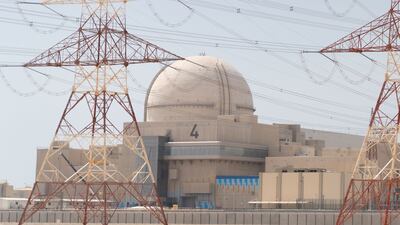Abu Dhabi's new climate strategy will focus on a shift towards cleaner energy sources, especially solar power, a senior executive at the emirate's environment agency has told The National.
Abu Dhabi announced its ambitious Climate Change Strategy for 2023-2027 in July. It aims to reduce emissions by 30 million tonnes by 2027, from 135 million tonnes in 2016.
The new plan to tackle climate change is designed to move the emirate towards a sustainable future, said Sheikha Al Mazrouei, executive director of Integrated Environment Policy and Planning at the Environment Agency Abu Dhabi.
“The strategy set an emission reduction target of 22 per cent from 2016 recorded emission levels by 2027,” Ms Al Mazrouei said.
“Greenhouse gases are measured by weight. This means that through the strategy, Abu Dhabi will reduce its emissions by 30 million tonnes by 2027 from the 135 million tonnes recorded in 2016.
Focus on low-carbon and renewables
“Different emitting sectors are going to contribute differently to achieve this target, but the main contribution will be coming from power production through low carbon clean energy sources and solar power introduction.”
The UAE’s energy portfolio includes solar, natural gas and nuclear. Nuclear energy is now the largest source of clean electricity in the UAE with the Barakah nuclear power plant generating up to 48 per cent of Abu Dhabi’s carbon-free electricity.
Emirates Water and Electricity Company announced in March that 80 per cent of the total power demand in Abu Dhabi is using renewable and clean energy from its solar and nuclear energy plants.
The climate strategy will be delivered through 81 initiatives, which include 12 key projects, covering all vulnerable or emitting sectors.
“The contributing emitting sectors projects cover oil and gas, energy, transport, industry, waste and agriculture. The main reduction of emissions will be in the power generation while diversifying the energy mix by introducing low-carbon power generation as well as renewables,” Ms Al Mazrouei said.
Eight countries with net-zero emissions – in pictures
The strategy is based on two main pillars: adaptation to decrease the impact of global warming on people, and mitigation which reduces the flow of heat-trapping greenhouse gases into the atmosphere.
Ms Al Mazrouei said Abu Dhabi will adapt to the expected risks of climate change by improving the resilience of the four key vulnerable sectors – energy, health, infrastructure and environment.
“The strategy makes adaptation to climate change part and parcel of government entities' plans,” she said.
“Additionally, it outlines Abu Dhabi's plan to reduce greenhouse gases significantly in line with the country's announced aim of achieving climate neutrality by 2050.
“Likewise, the strategy drives innovation in carbon capture and storage, and identifies actions aimed at economic diversification towards low-carbon sectors.”
The emirate plans to mitigate climate change impact by reducing emissions in key sectors and carbon capture, sequestration and storage.
“This is enabled by economic diversification through innovative, low-carbon solutions and identified opportunities,” she said.
Ms Al Mazrouei said one of the main projects in the strategy is to develop green or sustainable procurement to support investment in lower emission production locally.
“EAD is working very closely with the Department of Economic Development and its affiliated Industrial Development Bureau to promote investment and develop local production capabilities in more sustainable products,” she said.
She said the ambitious climate strategy has been carefully crafted to address challenges beyond just temperature rise, including rising sea levels, humidity, water salinity and extreme weather events.
“Abu Dhabi’s infrastructure, environment and ecosystem need to be protected from those impacts,” Ms Al Mazrouei said.
“Our existing and future infrastructure and key facilities must adapt to climate risks. Public health is another important area where projects are being designed to protect the public, especially workers, from exposure to heat stress resulting from the increased temperatures.”










